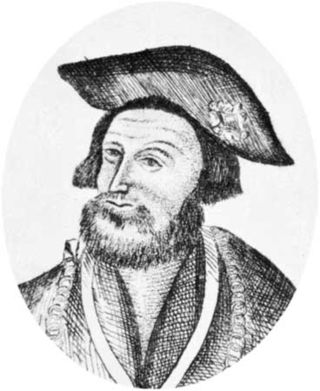
Sir David Lyndsay of the Mount was a Scottish knight, poet, and herald who gained the highest heraldic office of Lyon King of Arms. He remains a well regarded poet whose works reflect the spirit of the Renaissance, specifically as a makar.

Sir William Tyrone Guthrie was an English theatrical director instrumental in the founding of the Stratford Festival of Canada, the Guthrie Theater in Minneapolis, Minnesota, and the Tyrone Guthrie Centre at his family's ancestral home, Annaghmakerrig, near Newbliss in County Monaghan, Ireland. He is famous for his original approach to Shakespearean and modern drama.
The Scottish Renaissance was a mainly literary movement of the early to mid-20th century that can be seen as the Scottish version of modernism. It is sometimes referred to as the Scottish literary renaissance, although its influence went beyond literature into music, visual arts, and politics. The writers and artists of the Scottish Renaissance displayed a profound interest in both modern philosophy and technology, as well as incorporating folk influences, and a strong concern for the fate of Scotland's declining languages.
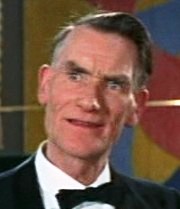
John Duncan Macrae was one of the leading Scottish actors of his generation. He worked mainly as a stage actor and also made five television appearances and seventeen films.

A Satire of the Three Estates, is a satirical morality play in Middle Scots, written by the makar Sir David Lyndsay. The complete play was first performed outside in the playing field at Cupar, Fife, in June 1552 during the Midsummer holiday, where the action took place under Castle Hill. It was subsequently performed in Edinburgh, also outdoors, in 1554. The full text was first printed in 1602, and extracts were copied into the Bannatyne Manuscript. The Satire is an attack on the Three Estates represented in the Parliament of Scotland – the clergy, lords and burgh representatives, symbolised by the characters Spiritualitie, Temporalitie and Merchant. The clergy come in for the strongest criticism. The work portrays the social tensions present at this pivotal moment in Scottish history.

David Rintoul is a Scottish stage and television actor. Rintoul was born in Aberdeen, Scotland. He studied at the University of Edinburgh, and won a scholarship to study at the Royal Academy of Dramatic Art in London.
Robert Kemp (1908–1967) was a Scottish playwright. Along with Tom Fleming and Lennox Milne, he was a founder of the Edinburgh Gateway Company.
Thomas Kelman Fleming, FRSAMD was a Scottish actor, director, and poet, and a television and radio commentator for the BBC.
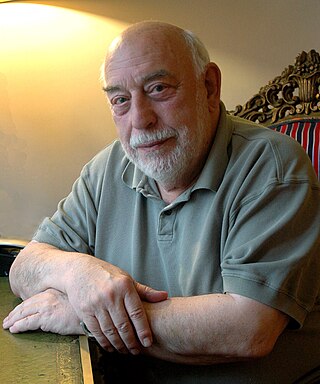
Frank Dunlop is a British theatre director.
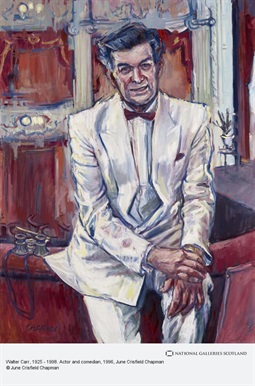
Walter Carr was a Scottish actor and comedian.
Fiona Kennedy Clark, OBE, DL is a Scottish singer, actress and broadcaster, and the daughter of Scottish and Gaelic singers Calum Kennedy and Anne Gillies. As a child she appeared with her parents as they performed as a family, and this developed into a successful solo career.
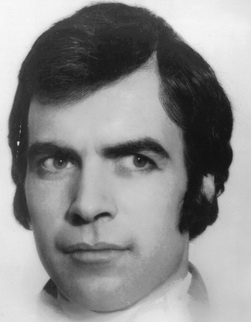
John Cairney was a Scottish stage, film and television actor who found fame through his one-man shows on Robert Burns, Robert Louis Stevenson, Robert Service, Charles Rennie Mackintosh and William McGonagall.

Garleton Castle is a courtyard castle, dating from the sixteenth century, about 1.5 miles (2.4 km) north of Haddington, just north of the Garleton Hills in East Lothian, Scotland.

Theatre in Scotland refers to the history of the performing arts in Scotland, or those written, acted and produced by Scots. Scottish theatre generally falls into the Western theatre tradition, although many performances and plays have investigated other cultural areas. The main influences are from North America, England, Ireland and from Continental Europe. Scotland's theatrical arts were generally linked to the broader traditions of Scottish and English-language literature and to British and Irish theatre, American literature and theatrical artists. As a result of mass migration, both to and from Scotland, in the modern period, Scottish literature has been introduced to a global audience, and has also created an increasingly multicultural Scottish theatre.
Thomas Welsh Watson was a Scottish-born stage, television and film actor.
Cedric Thorpe Davie OBE was a musician and composer, most notably of film scores such as The Green Man in 1956. A high proportion of his film and documentary music and his concert pieces have a Scottish theme.
The Gateway Theatre was a Category C listed building in Edinburgh, Scotland, situated on Elm Row at the top of Leith Walk.
Wildcat Stage Productions was an influential left-wing theatre and music production company based in Glasgow. Founded in 1978 as a spin-off from the 7:84 Company, it formed a key part of the Scottish touring theatre network for the next 20 years, creating more than 80 shows and giving many thousands of performances across Scotland, the UK and internationally. The company was named after the term for unofficial industrial action, excluding the word "theatre" from its name to avoid middle-class or bourgeois associations.
James Kinsley, FBA, FRSL was a Scottish literary scholar.
Sadie Aitken was a Scottish theatre manager, producer, actor and theatre activist prominent in Scottish theatre from 1935 until her death. Her contribution to theatre in Scotland spanned amateur, community, applied and professional drama. As a compliment, she was nicknamed "The Caledonian Lilian Baylis".









